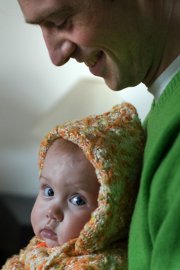Dutch woman is world’s first-ever Professor of Fatherhood

In a few days Professor Renske Keizer of the University of Amsterdam, 32, will become the world’s first and only ‘Professor of Fatherhood’. Mother of three children herself, she researches the effect fathers have on children in different family configurations and opposes the ‘glorification’ of motherhood in the Netherlands, which constantly downplays the role of fathers in Dutch families regardless of their contribution.
Keizer explains that fathers of low income families play a lesser role than those of high income families and that a lack of affordable childcare, lack of paid and unpaid paternity leave and many other 1950s relics skew the balance between mothers and fathers, with fathers getting the short end of the stick. While Dutch fathers have voiced a desire to want to work part-time like most mothers do but cannot because they are expected to work full time and Dutch working mothers making less than working fathers, it’s tough to foster any change without taking a hard financial hit.
Dutch women entered the job market in the 1970s, decades later than their western counterparts, and the obstacles facing them today stem from the ingrained idea that women don’t need to work to support their families or develop themselves. “Men work to take care of their family, that’s their role. Many women see work as something that conflicts with what they do at home, clean and take care of the children. That’s Dutch culture. You’re a bad mother if you bring your children to daycare more than three times a week, but not a bad father. Society needs to make a change.”
Keize is attempting to see if being a father contributes to raising children in a unique way, but warns that maybe it does not. She explains that generally fathers speak to their children more like adults, while mothers tend to speak to their children more on their level in part because mothers tend to know their children’s capabilities better. However, fathers play a major role in increasing children’s vocabulary. The same goes with reading bedtime stories, something Keizer admits high income families do way more than low income ones: a mother reads a story as it is in the book, while dad makes stuff up as he goes along, triggering children’s creative thinking.
Keizer is also researching LBGTI parents and is very aware of the differences between white Dutch folks and other ethnic groups, hoping that she can attract more diversity to her study.
(Link: www.parool.nl, Photo by Eelke Dekker, some rights reserved)

Leave a Reply